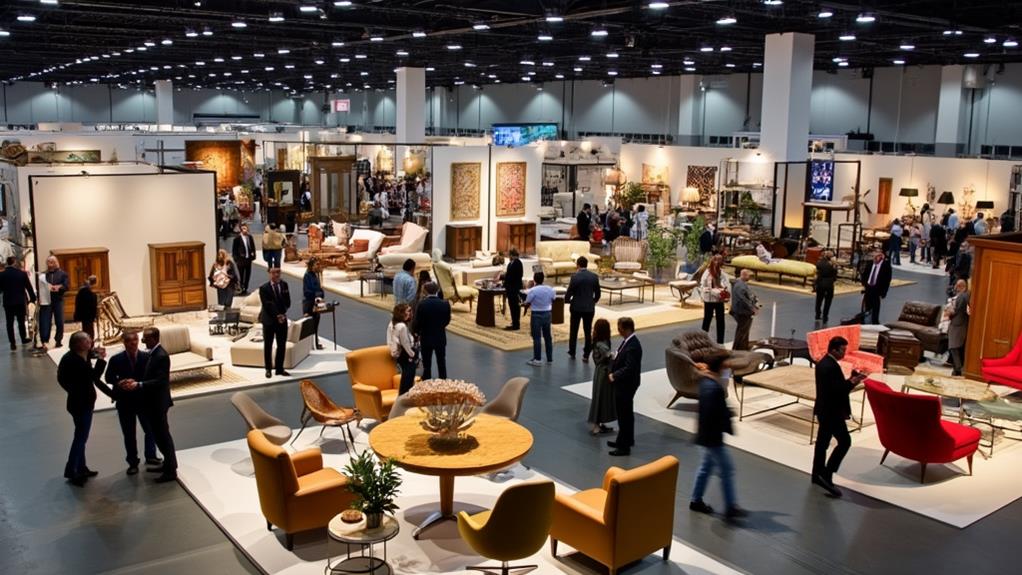In the global furniture wholesaling market, we're observing significant trends driven by diverse factors. E-commerce is transforming how consumers access and evaluate products, with urbanization and increased disposable incomes fueling demand. Meanwhile, the luxury furniture segment is expanding, particularly in North America, and sustainability is becoming an essential aspect as consumers seek eco-friendly options. Technological advancements like smart furniture innovations are reshaping consumer expectations. Additionally, regional preferences impact strategies, as North American consumers prioritize durability, while European buyers focus on craftsmanship. Staying competitive requires adapting to these evolving dynamics, and there's much more to explore about these intricate market trends.
Table of Contents
ToggleMarket Dynamics
The furniture wholesaling market is experiencing transformative shifts driven primarily by the surge in online shopping. As we see a global increase in demand, e-commerce platforms have revolutionized how consumers access furniture, allowing them to shop from the comfort of their homes.
This shift is further fueled by rising disposable incomes, which enhance consumer purchasing power, and urbanization, leading to increased demand for furniture in newly developed spaces. Lifestyle changes have also pushed consumers towards multifunctional furniture, adding complexity to market dynamics.
However, we've faced significant supply chain disruptions due to trade restrictions and factory closures during the COVID-19 pandemic. As these restrictions ease, we're anticipating a gradual recovery, with consumer confidence slowly returning, stabilizing the market.
Luxury Furniture Trends
Luxury furniture trends are gaining momentum as global markets project significant growth in the coming years. This expansion is driven by increasing disposable incomes and a growing preference for high-quality, well-crafted pieces.
North America currently leads the luxury furniture market, followed closely by Europe. Key manufacturers like Restoration Hardware and Hooker Furniture Corporation are at the forefront, offering innovative designs that appeal to discerning customers.
The market is divided into indoor and outdoor furniture, with a strong emphasis on quality craftsmanship and unique design elements. Artisan Furniture UK, for instance, focuses on creating luxury pieces that stand out.
As consumers prioritize elegance and sophistication, the demand for luxurious furnishings continues to climb, reshaping industry standards.
Sustainability and Technology
As we explore the evolving landscape of furniture trends, a significant shift towards sustainability and technology emerges alongside luxury preferences.
More consumers demand eco-friendly furniture, opting for pieces crafted from recycled materials. Ethical manufacturing practices, including fair labor standards, are gaining traction, reflecting a broader societal push for sustainability.
Smart furniture, featuring innovations like wireless charging, is also gaining popularity, enhancing functionality and convenience.
Personalization and customization options allow consumers to tailor their furniture to specific needs, offering a unique appeal.
Companies embracing these trends not only meet consumer expectations but also build trust through transparency in sourcing and production.
Online Shopping Impact
E-commerce has revolutionized the furniture wholesaling industry, transforming how we shop and interact with products. Now, we can explore an extensive range of furniture styles and prices from the comfort of our homes. This shift has broadened the global reach for wholesalers, enabling them to tap into diverse markets.
Online shopping offers convenience and accessibility, allowing us to compare products and read customer reviews before making a purchase. Data analytics play an essential role in understanding consumer behavior, helping businesses tailor their offerings to meet demand.
Additionally, e-commerce platforms foster transparency and trust by providing detailed product descriptions and images. As a result, our buying decisions become more informed, and manufacturers can more effectively reach potential customers worldwide.
Regional Preferences
When analyzing furniture markets, regional preferences play an essential role in shaping consumer demand and business strategies. Each region exhibits distinct tastes, influenced by cultural norms, climate, and economic factors.
In North America, consumers lean towards durable, functional office furniture, reflecting a preference for practicality. Meanwhile, European buyers often prioritize craftsmanship and design, valuing aesthetic appeal and quality.
In Asia-Pacific, rapid urbanization and rising incomes drive demand for innovative and multifunctional designs that maximize space efficiency.
Understanding these preferences is imperative for wholesalers aiming to tailor their offerings and enhance their global market presence. By aligning product lines with local tastes, businesses can effectively meet consumer needs and gain a competitive edge in the diverse landscape of global furniture wholesaling.
Competitive Landscape
The competitive landscape in the furniture wholesaling industry is both dynamic and challenging, requiring us to stay vigilant and adaptive. Major players like Ashley Furniture Industries Inc., Tempur Sealy International, and Hunter Douglas N.V. dominate the market, making it essential for us to understand their strategies and offerings.
We must analyze how these companies leverage their strengths in areas like supply chain efficiency, product innovation, and market penetration. Additionally, regional preferences play a role in shaping competition. For example, North American consumers prioritize durability and functionality, while European buyers favor craftsmanship and design.
Future Outlook
Looking ahead, we anticipate a dynamic future for the furniture wholesaling industry, shaped by technological advancements and shifting consumer expectations.
The integration of e-commerce and data analytics will continue to transform how wholesalers reach global markets, providing insights into consumer preferences and improving sales strategies.
As sustainability becomes a key concern, demand for eco-friendly and ethically produced furniture will grow, pushing companies to adopt transparent sourcing practices.
Additionally, smart furniture, offering features like wireless charging, will become more prevalent, meeting the needs of tech-savvy consumers.
Urbanization and rising incomes in regions like Asia-Pacific will further drive market growth, increasing demand for multifunctional and high-quality pieces.


